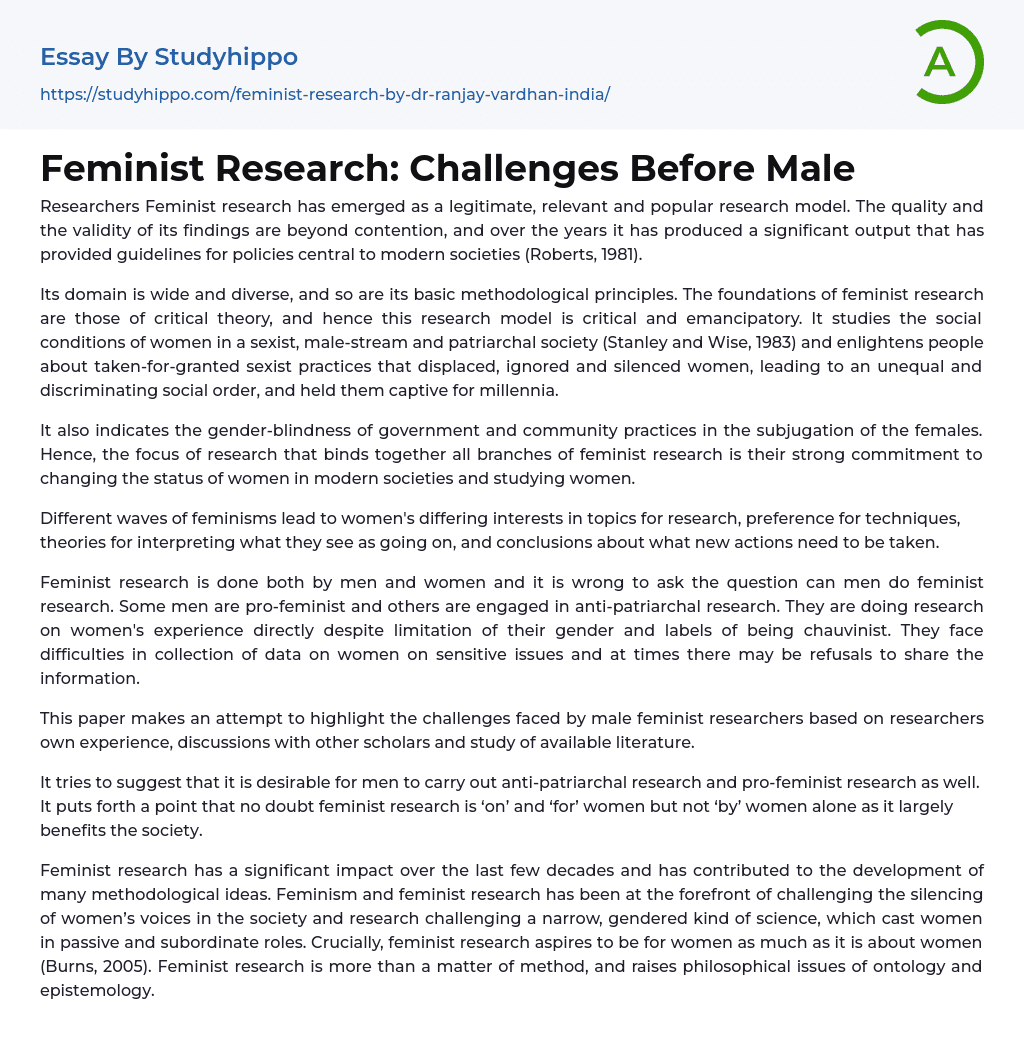Feminist research is a well-respected and significant model of research that has produced valuable insights informing crucial modern policies. Its findings are widely accepted as valid (Roberts, 1981).
Guided by critical theory principles, feminist research covers a wide range of topics and approaches. Its underlying model is both critical and emancipatory, shedding light on the societal circumstances faced by women in a patriarchal and male-dominated society (Stanley and Wise, 1983). The research aims to raise awareness about insidious sexist practices that have marginalized, disregarded, and silenced women for centuries. By doing so, it exposes an inequitable and discriminatory social structure that has constrained women for far too long.
Feminist studies research emphasizes the perpetuation of gender inequality and subjugation of women by government and community practices. This unifying feature highlights the necessity for a thorough investi
...gation to improve the status of women in contemporary societies.
Research on feminism is not restricted to women as men can also engage in it. The question of whether men can carry out feminist research is unfounded. While some men are pro-feminist, others conduct research against patriarchy. Despite being male, they investigate the experiences of women, although they may face challenges due to gender biases and accusations of chauvinism. Data collection can be particularly problematic for sensitive topics, and some individuals may decline to share information.
The challenges encountered by male feminist researchers are explored in this paper through the author's personal experiences, as well as conversations with other academics and literature review.
Feminist research has had a noteworthy influence in recent years, introducing various methodological concepts and challenging the marginalization of women's perspectives both in society an
research. It opposes gender bias that presents women as subordinate or passive, striving not only to study but also to empower them (Burns, 2005). Additionally, feminist research tackles significant philosophical concerns such as ontology and epistemology, extending beyond a mere methodology subject.
According to Reinharz (1992), there are ten assertions of Feminist research, one of which is that feminism is a viewpoint rather than a research technique. Feminism involves continual evaluation of non-feminist scholarship, is led by feminist theory, and has the goal of effecting social transformation. Additionally, there exist various approaches to feminist research due to differing theoretical explanations for gender-based oppressions and inequalities. Feminist theories endeavor to clarify, dispute, and ultimately alter existing gender relations.
The research method follows a feminist perspective by aiming to understand the experiences of both sexes, examining gender-based disparities and power imbalances. Nevertheless, male researchers often work within a patriarchal framework that perpetuates it by attributing women's challenges to societal systems instead of acknowledging systemic oppression.
The perception that feminist research disregards crucial criteria like measurement, validity, objectivity, reliability, representativeness, and generalization while rejecting quantitative methods is widely held. However, this notion is not entirely accurate as some feminists may still adhere to it. During the 1960s and 1970s when feminist activism aimed at ending women's exclusion from public life by highlighting their confinement to the private sphere, feminist research adopted a political agenda.
In the 1970s and 1980s, feminist empiricists questioned the validity of knowledge which primarily focused on masculine topics and reflected male experiences. They argued that the theoretical frameworks were based on masculine gender identity in contemporary culture and the narrative constructed promoted
the interests of men as a group, marginalizing women. The whole symbolic order by which knowledge claims were articulated privileged male experiences and conceptualized females as lacking characteristics associated with masculinity. As a result, several writers advocated for a feminist epistemology during this period, including Corman (1978), Lehrer (1974), Pollock (1979, 1986) (Webb, 2000).
It may be challenging for men to research women's experiences. If men do take on this task, they need to give control over the design and execution of the research to a critical reference group of women. Furthermore, they may be less inclined to study women's experiences directly and instead focus on their own dissatisfaction with patriarchal elements. Men should investigate how men establish and maintain the structures of subordination that affect women. Feminist methodology can be applicable to men conducting research about their own experiences and those of other men with the goal of transforming oppressive practices.
- Women's Suffrage essays
- Women'S Rights essays
- Women Empowerment essays
- Sojourner Truth essays
- Social Construction of Gender essays
- Abortion essays
- Abuse essays
- Animal Rights essays
- Animal Testing essays
- Assault essays
- Bullying essays
- Controversial Issue essays
- Crash essays
- Cyber Bullying essays
- Feminism essays
- Human Rights essays
- Immigration essays
- Inequality essays
- Poverty essays
- Prejudice essays
- Racism essays
- Torture essays
- Violence essays
- Boy essays
- Gay essays
- Gender essays
- Gender Identity essays
- Gender Roles In Society essays
- Gender Stereotypes essays
- Girl essays
- Homosexuality essays
- Human Sexual Behavior essays
- Lgbt essays
- Man essays
- Masculinity essays
- Sexual Orientation essays
- Transgender essays
- Woman essays
- Bangladesh essays
- China essays
- Hong Kong essays
- India essays
- Japan essays
- Kuala Lumpur essays
- Malaysia essays
- Manila essays
- Pakistan essays
- Philippines essays
- Singapore essays
- Vietnam essays




